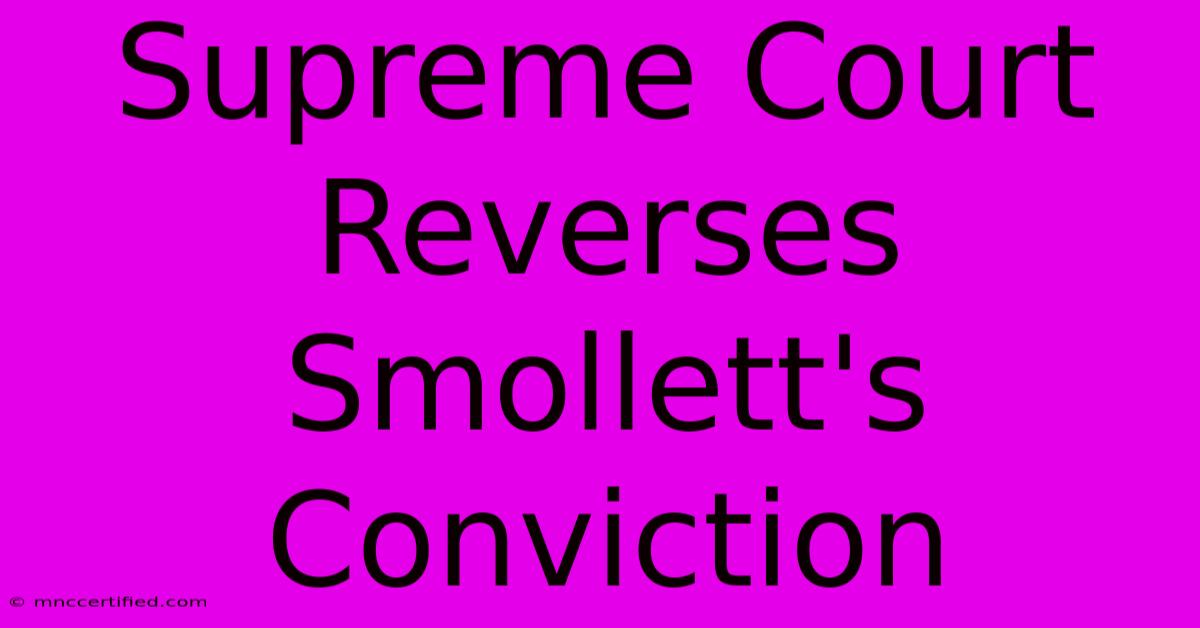Supreme Court Reverses Smollett's Conviction

Table of Contents
Supreme Court Reverses Smollett's Conviction: A Deep Dive into the Case and its Implications
The Supreme Court's decision to reverse Jussie Smollett's conviction has sent shockwaves through the legal and political landscapes. This landmark ruling raises crucial questions about prosecutorial overreach, the First Amendment, and the very nature of justice. This article delves deep into the case, examining the events leading to the conviction, the Supreme Court's reasoning, and the broader implications of this controversial decision.
Understanding the Jussie Smollett Case
Jussie Smollett, a former actor known for his role in the television series Empire, was initially accused of staging a hate crime against himself in January 2019. He claimed he was attacked by two men who yelled racist and homophobic slurs, poured bleach on him, and placed a noose around his neck. The incident sparked widespread outrage and fueled intense national discussions about race and hate crimes.
However, following an extensive investigation, Chicago police determined that Smollett had orchestrated the entire event. He was subsequently charged with disorderly conduct, a felony. A jury found him guilty on five of the six counts, leading to a sentence of 150 days in jail and community service. This conviction was later overturned by an appellate court, a decision ultimately upheld by the Supreme Court.
The Supreme Court's Reversal: Key Arguments
The Supreme Court's decision to reverse Smollett's conviction hinged on a critical point: the sufficiency of the evidence presented at trial. The justices argued that the prosecution failed to provide enough substantial evidence to prove beyond a reasonable doubt that Smollett had the specific intent to commit a felony, a crucial element in the disorderly conduct charge.
The court's majority opinion emphasized the need for rigorous evidentiary standards in criminal prosecutions, especially in cases with significant public attention. They highlighted inconsistencies in the prosecution's narrative and questioned the reliability of certain key pieces of evidence. This underscores the importance of due process and the presumption of innocence in the American justice system.
The First Amendment Argument: A Tangential Consideration
While not the central focus of the ruling, the First Amendment played a tangential role in the Supreme Court's deliberations. Some legal scholars have argued that the prosecution's actions could be viewed as an infringement on Smollett's right to free speech, particularly regarding his initial claim of a hate crime. However, the court's decision primarily focused on the evidentiary issues, rather than explicitly addressing First Amendment concerns.
Implications and Future Considerations
The Supreme Court's reversal of Smollett's conviction has far-reaching implications. It sets a precedent for future cases, raising the bar for the evidence required to convict individuals accused of similar crimes. This could potentially make it more challenging to prosecute cases involving alleged false claims of hate crimes.
This decision also reignites the debate about the balance between protecting individuals from false accusations and ensuring accountability for those who misuse the justice system. Finding this balance will require careful consideration by lawmakers, law enforcement, and the judicial system as a whole.
The Role of Public Opinion and Media Coverage
The Smollett case became a highly politicized and heavily publicized event. The media's coverage played a significant role in shaping public perception, which in turn, influenced the legal proceedings. This underscores the need for caution and objectivity in media reporting on high-profile cases to avoid prejudicing potential jurors and influencing the outcome of trials.
Conclusion: A Complex and Controversial Ruling
The Supreme Court's reversal of Jussie Smollett's conviction is undoubtedly a complex and controversial decision. It highlights the importance of robust evidentiary standards, the challenges of prosecuting cases involving alleged false claims, and the significant role of public opinion and media coverage in the judicial process. The long-term consequences of this ruling remain to be seen, but it undoubtedly marks a significant moment in American jurisprudence. Further analysis and discussion are needed to fully understand the implications of this landmark case.

Thank you for visiting our website wich cover about Supreme Court Reverses Smollett's Conviction. We hope the information provided has been useful to you. Feel free to contact us if you have any questions or need further assistance. See you next time and dont miss to bookmark.
Featured Posts
-
Floridas Bondi Trumps Ag Nominee
Nov 22, 2024
-
Snowflake Stock Jumps After Strong Outlook
Nov 22, 2024
-
Ethos Gap Insurance Phone Number
Nov 22, 2024
-
Giants Qb Jones Regret Over Losses Future
Nov 22, 2024
-
Media Mourns Veteran Ken Reid
Nov 22, 2024